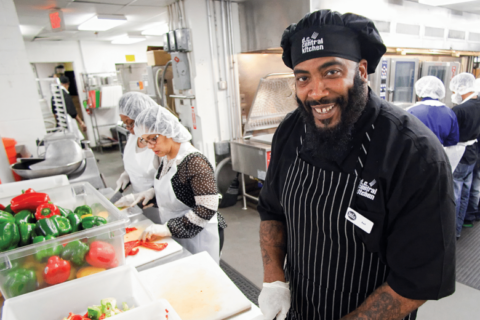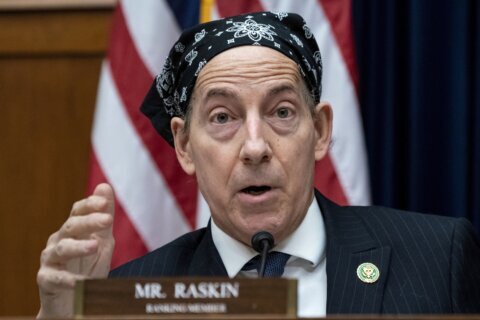
D.C. had a turbulent start to 2023 — from a forsaken criminal code, a sharp spike in car thefts and to the recent resignation of Deputy Mayor John Falcicchio following allegations of sexual assault.
Meanwhile, D.C. Attorney General Brian Schwalb has been settling into his new position as the top prosecutor in the nation’s capital.
Three months into his tenure, Schwalb went on WTOP’s “DMV Download” podcast to discuss where he stands on the issues facing the District and what he hopes to accomplish as attorney general.
The following Q&A has been edited for clarity and brevity.
- Q:
Why did you want to become D.C. Attorney General? What brought you to this position?
- A:
Schwalb: “For me, I’m a law geek. I love the law. And now I get a chance to do something I love doing in service of a city I love. I’m a third-generation Washingtonian and to get a chance to come to work every day and serve the people who live in the District of Columbia, my home. What a privilege!”
- Q:
What is under the purview and power as D.C. Attorney General?
- A:
Schwalb: “So the Office of Attorney General, the elected Office of the Attorney General, is the chief law officer of the District of Columbia.
“I’d like to say we have three general areas of responsibility. The first is doing the law work of the city — we defend the city, the agencies, the mayor, the council, in litigation lawsuits. We provide legal advice to the agencies and the council and the mayor. We do the transactional work, bond work and tax work — all of what you might consider traditional legal work for the District of Columbia. So that’s the first bucket.
“The second bucket is we are responsible for juvenile justice in our city. We have a bifurcated criminal justice system in D.C. The U.S. Attorney, appointed by the president of the United States, has primary responsibility over adult criminal behavior in the city. The Office of the Attorney General is elected by the people who live in the District of Columbia and has principal responsibility for kids defined as those under 18 years old, who are charged with crimes. So juvenile justice is the second set of responsibilities we have in the in this office.
“And the third is advancing and protecting the public interest. And that, generally, can be thought of as how we protect the environment, consumers, workers, tenants, making sure that our anti-discrimination and anti-hate laws are aggressively enforced.”
- Q:
As you mentioned, one of your responsibilities as Attorney General is representing the D.C. government, the council and the mayor. Recently, Deputy Mayor John Falcicchio resigned and is under investigation. A D.C. employee has alleged that she was sexually harassed by Falcicchio. Currently, an attorney for D.C. Mayor Muriel Bowser’s administration has been speaking on the mayor’s behalf. Are you playing any role in this investigation?
- A:
Schwalb: “At the moment, we don’t.”
- Q:
Is there any case in which you would get involved?
- A:
Schwalb: “I don’t want to speculate on what might happen in the future. But suffice it to say that as the independent attorney general, we’re watching closely what’s happening. And if there’s a proper role to protect the interests of the District of Columbia and people who live here in the District of Columbia, that’s not something that our office is going to shy away from.”
- Q:
What’s the status of the two lawsuits mounted against Commanders owner Dan Snyder and NFL Commissioner Roger Goodell?
- A:
Schwalb: “Both of those cases remain pending in the court. When you’re elected as the Attorney General for the District of Columbia, I think it’s incumbent upon anybody to come in and give a fresh look, and try to make an independent determination of the wisdom, the merit, the appropriateness of moving forward with all kinds of investigations and lawsuits, not just the high profile cases you mentioned.
“I also come to this office with a high level of confidence that the professionals, the lawyers in this office, have a very thorough way of doing their job, and that when lawsuits and claims are brought, they’re brought based on a good-faith bases that the law and the facts support the theories and the claims for recovery that the office is seeking. So, those two cases, among many other cases, remain pending in the court system.”
- Q:
Do you have any sense of whether those lawsuits will be dropped or whether they’ll go forward?
- A:
Schwalb: “Those cases are going forward.”
- Q:
Your predecessor Karl Racine was also known for his tense relationship with the mayor. What’s your approach to interacting with the mayor?
- A:
Schwalb: “I think it’s very important for everybody to understand that having an independent attorney general’s office is very, very important for democracy in the District of Columbia. It’s for good government and the District of Columbia. And as you alluded to, there can always be tensions between the different branches of the government. And that tension can be healthy and not something to shy away from.
“I got a lot of good advice from my dad before he died. And one piece of advice was we can disagree without being disagreeable. And oftentimes, that’s the job of the people elected in government. Sometimes we have to and should disagree with one another. I don’t think that the residents and taxpayers of the District of Columbia are well served by having an Office of a Mayor and an Office of the Attorney General constantly squabbling and fighting with each other, or perceiving one another as political antagonists.
“So my approach has been to bring to this job what I’ve brought to every law job I’ve had: to focus on the issues, do right by the people who elected me to be here, call balls and strikes and try to move on. And sometimes that may require the mayor and I to disagree about things, which is totally OK. And then we’ll move on to the next issue, where we’ll hopefully work shoulder to shoulder in furtherance of what we’re both elected to do, which is serve the people who voted for us.”
- Q:
For example, you called a ball — to extend this metaphor — on Mayor Bowser’s strike against D.C.’s revised criminal code. In other words, you supported the code and the mayor did not. Now that Congress has blocked the revised code, what’s next? What can District residents look forward to as far as what their century-old criminal code will become?
- A:
Schwalb: “As everybody seems to know, 95-plus percent of that revised criminal code was noncontroversial, universally believed by everybody to be what we needed here in the District of Columbia to bring our outdated criminal code into the modern era. And let’s be clear, having an unclear, outdated criminal code hurts public safety in the District of Columbia. It gets in the way of clear, effective, efficient administration of justice.
“And most people you speak to — who know anything about criminal justice — know that it’s not the threat of long sentences that deter crime. It’s that if you do something wrong, you will be promptly held accountable, with swift and certain consequences to the prosecutorial system. If your laws are not clear, if they’re internally inconsistent, it gets in the way of having an effective administration of justice.
“So anybody who cares about wanting the District of Columbia to be a safe place — which I certainly do, which the people here in the office do — should be in favor of clarifying a code that over time has become vague and inconsistent.
“To be sure, in any legislation, there are things that people disagree with. That’s the nature of the legislative process. And it’s also a part of the process that when the council passes a law, it is the mayor’s prerogative, should she choose to do so, to veto the law, and then the council’s prerogative to decide whether it wants to override that veto. That’s what happened here. Our legislative process, our democracy in the District of Columbia was working just like it works in 50 other states across the country. And that’s why it was such an affront to the folks who live here in the District of Columbia, who pay taxes here in the District of Columbia — oftentimes more taxes than people across the country pay — to have elected officials who are not elected by the D.C. residents come in and basically substitute their judgment, as if they care more or know more about the District of Columbia than those of us who live here.
“Frankly, it’s insulting.”
- Q:
Getting more specific, the chief issues with the revised criminal code was this lighter maximum sentences for violent crimes — especially carjacking. It’s a crime that juveniles are committing more and more. As the attorney general and chief law officer for D.C. youth, how do you deal with young offenders of carjacking?
- A:
Schwalb: “Look, there’s nothing more terrifying than being carjacked. They are terrifying crimes. They are oftentimes very, very dangerous both in the moment of a car being stolen, and then in the moments afterward, where it’s sped off and can hurt other people around the crime scene. It’s terrible.
“We all as a community and everybody elected to public office needs to do everything we can to try to address carjacking and other types of violent crime. Because everybody deserves to be safe and feel safe in the city. And when we don’t feel safe, going to the grocery store or picking up our kids or even pumping gas in our car, we don’t get to the other really important issues we got to get to as a city.
“I’m dialed in on how we try to make sure we’re safe. And one of the things we do here in the Office of the Attorney General is we prosecute crimes by kids 17 years old and younger. They are subject to our jurisdiction. We have to prosecute crimes when we have the evidence to do it — particularly carjackings, which are hard cases to prosecute for a variety of reasons.
“But it’s important to know a couple of things. One is the vast majority of arrests made in the District of Columbia are of adults, not of young people. I really think it’s important for the media and for our community to know that fact exists because too often, we vilify kids, and we forget that kids are kids. Recognizing what the facts are around certain types of crimes and who’s committing them is a very important thing.
“We also have to understand why are carjackings happening, and particularly when young people are committing crimes. What are some of the root causes as to why kids get into trouble with the law? And if we want to make ourselves safer as a community, in the long run, we got to address those root causes of why kids are getting into trouble because by definition, prosecution is always after the fact, it’s after a crime has occurred. If we want to make ourselves safer, we have to stop crime before it happens.”
- Q:
There’s a report that came out about the U.S. Attorney’s Office and how over the past few years, they’ve been unable to prosecute more and more crimes. In short, more cases have been dropped. Is your office seeing a similar trend? Or are you still able to prosecute as many cases as you’d like?
- A:
Schwalb: “So the decision on whether to paper a case or charge a case is part of the prosecutorial discretion that any prosecutor’s office has to exercise. The Office of (the) Attorney General does that just like the U.S. Attorney’s Office does it.
“I take a lot of pride in the prosecutors in our office exercising that discretion with great integrity and judgment. We don’t make cases or charge cases when we don’t have sufficient evidence to meet our burden of proof. We have to have constitutionally acquired evidence and sufficient evidence to prove the case. And when we’re talking about kids in particular, that’s ever more important because simply being charged with a crime and brought into the criminal justice system is shown through data to lead to worse results for kids. So if we can keep kids out of the criminal justice system in the long run, that’s better for all of us.
“That being said, our charging rates and paper rates, particularly for violent crimes, are consistent with what they’ve been historically. We do charge the crimes when we have the evidence to make our case. We don’t divert gun cases, whether they’re gun possession cases or use of a gun in the course of a crime. We don’t divert carjacking cases or homicide cases; we prosecute those cases when we have enough evidence to do so.”
- Q:
What is the status of your lawsuits against those who stormed the U.S. Capitol on Jan. 6, 2021?
- A:
Schwalb: “We have a civil lawsuit that’s pending now against the Proud Boys and the Oath Keepers, as well as 38 or 40 individuals who were members of those organizations who participated in the insurrection on Jan. 6, 2021, which was a complete affront on our democracy on everything Americans hold to be sacred.
“Our office, like many law enforcement agencies around the country, is going to do our best to hold the people accountable for that type of conduct. Our civil lawsuit is under the Ku Klux Klan Act, as well as conspiracy theories and assault and battery common law, assault and battery theories to hold those organizations and people accountable.
“We’re also looking hard at the results of the Jan. 6 commission report to see whether, in addition to what I think of as the brawn that came to the Capitol that day, the law should also hold the brains responsible — those who conspired behind the scenes, financed the insurrection, brought people together — those folks to need to be held accountable for what happened that day.”
- Q:
What is the D.C. Attorney General’s role in addressing the opioid epidemic?
- A:
Schwalb: “We’re doing everything we possibly can. Fentanyl is a huge public health threat. It kills more people every year in the District of Columbia than gun violence, almost twice as many. And it’s something that everybody in government needs to be doing what we can to address.
“One of the things the Office of the Attorney General did was bring lawsuits against the types of companies that made a lot of money, selling and getting people addicted to opioids. And with those settlements from those lawsuits that we have brought into the District of Columbia and will continue to bring into the District of Columbia — nearly $80 million — we’re going to make sure that those dollars get out into the community to make sure that people who need it, either for harm reduction or for substance abuse treatment, get those dollars as quickly as they can.”
- Q:
Recently, your office has warned District residents about hidden fees at restaurants. What should we be looking out for when we go out to eat?
- A:
Schwalb: “This is an issue about transparency. It’s really nothing more complicated than that. Consumers in the District of Columbia, whether they’re dining at restaurants or buying goods or services, are entitled to know what they’re buying. They’re entitled to know where their money is going. They’re entitled not to be surprised at their purchase after they’ve made it. And so what we did, with respect to the restaurant fees, was to use our power of education, our power of outreach, to let the community know, both diners and consumers, as well as restaurant owners, that this is an issue that many, many people are concerned about.”
“Our office was receiving dozens of complaints from consumers who were confused by the fees they were seeing on their bills. And what the law requires is transparency; it requires the restaurants to make sure that before you order your meal, you know whether you’re going to be charged a fee, and that you know what that fee is going to. And it requires the restaurant owners, if they tell you those fees are going to our servers to make sure that those dollars actually go to the servers. You can imagine the confusion. I admit, I had some confusion recently, when I went into a restaurant and I saw a service fee on the bill. And the confusion is, is that service fee, if I pay it is going to go to the workers who are serving me or is it going to go to the house. Because if the restaurant tells me it’s going to the house, I want to make sure I leave a tip for the servers. But if the house tells me this is going to our workers already, I’m already paying that 20% tip by virtue of paying the service fee. So it’s really about transparency and clarity which all consumers in the District of Columbia are entitled to.”
- Q:
What’s your favorite drink?
- A:
Schwalb: “I have said publicly that I’m a fan of tequila. Tequila on the rocks with a lime is going to be a favorite of mine.”







